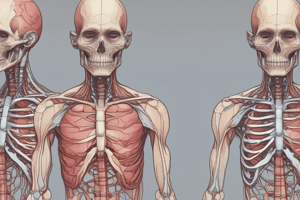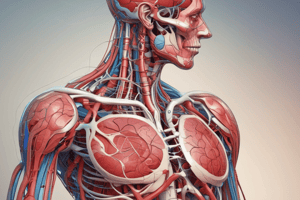Podcast
Questions and Answers
Transportation. All of the substances essential for cellular metabolism are transported by the circulatory system. These substances can be categorized as follows: – a. Respiratory. Red blood cells, or erythrocytes, transport oxygen to the cells,Carbon dioxide produced by cell respiration is carried by the blood to the lungs for elimination in the exhaled air. – b. Nutritive. The blood then carries absorbed products of digestion through the liver and to the cells of the body. – c. Excretory. Metabolic wastes (such as urea), excess water and ions, and other molecules not needed by the body are carried by the blood to the kidneys and excreted in the urine. 2. ______. The circulatory system contributes to both hormonal and temperature regulation. a. Hormonal.
Transportation. All of the substances essential for cellular metabolism are transported by the circulatory system. These substances can be categorized as follows: – a. Respiratory. Red blood cells, or erythrocytes, transport oxygen to the cells,Carbon dioxide produced by cell respiration is carried by the blood to the lungs for elimination in the exhaled air. – b. Nutritive. The blood then carries absorbed products of digestion through the liver and to the cells of the body. – c. Excretory. Metabolic wastes (such as urea), excess water and ions, and other molecules not needed by the body are carried by the blood to the kidneys and excreted in the urine. 2. ______. The circulatory system contributes to both hormonal and temperature regulation. a. Hormonal.
Regulation
Nutritive. The blood then carries absorbed products of digestion through the liver and to the cells of the body. – c. Excretory. Metabolic wastes (such as urea), excess water and ions, and other molecules not needed by the body are carried by the blood to the kidneys and excreted in the urine. 2. ______. The circulatory system contributes to both hormonal and temperature regulation. a. Hormonal.
Nutritive. The blood then carries absorbed products of digestion through the liver and to the cells of the body. – c. Excretory. Metabolic wastes (such as urea), excess water and ions, and other molecules not needed by the body are carried by the blood to the kidneys and excreted in the urine. 2. ______. The circulatory system contributes to both hormonal and temperature regulation. a. Hormonal.
Regulation
The circulatory system is an organ system that passes nutrients (such as amino acids, electrolytes and lymph), gases, hormones, blood cells, etc. to and from cells in the body to help fight diseases, stabilize body temperature and pH, and to maintain homeostasis. Functions of the Circulatory System – The functions of the circulatory system can be divided into three broad areas: transportation, regulation, and protection. – 1. ______. All of the substances essential for cellular metabolism are transported by the circulatory system. These substances can be categorized as follows:
The circulatory system is an organ system that passes nutrients (such as amino acids, electrolytes and lymph), gases, hormones, blood cells, etc. to and from cells in the body to help fight diseases, stabilize body temperature and pH, and to maintain homeostasis. Functions of the Circulatory System – The functions of the circulatory system can be divided into three broad areas: transportation, regulation, and protection. – 1. ______. All of the substances essential for cellular metabolism are transported by the circulatory system. These substances can be categorized as follows:
Transportation
A. Respiratory. Red blood cells, or erythrocytes, transport oxygen to the cells,Carbon dioxide produced by cell respiration is carried by the blood to the lungs for elimination in the exhaled air. – b. ______. The blood then carries absorbed products of digestion through the liver and to the cells of the body. – c. Excretory. Metabolic wastes (such as urea), excess water and ions, and other molecules not needed by the body are carried by the blood to the kidneys and excreted in the urine. 2. Regulation. The circulatory system contributes to both hormonal and temperature regulation. a. Hormonal.
A. Respiratory. Red blood cells, or erythrocytes, transport oxygen to the cells,Carbon dioxide produced by cell respiration is carried by the blood to the lungs for elimination in the exhaled air. – b. ______. The blood then carries absorbed products of digestion through the liver and to the cells of the body. – c. Excretory. Metabolic wastes (such as urea), excess water and ions, and other molecules not needed by the body are carried by the blood to the kidneys and excreted in the urine. 2. Regulation. The circulatory system contributes to both hormonal and temperature regulation. a. Hormonal.
Metabolic wastes (such as urea), excess water and ions, and other molecules not needed by the body are carried by the blood to the kidneys and excreted in the urine. 2. Regulation. The circulatory system contributes to both hormonal and temperature ______. a. Hormonal.
Metabolic wastes (such as urea), excess water and ions, and other molecules not needed by the body are carried by the blood to the kidneys and excreted in the urine. 2. Regulation. The circulatory system contributes to both hormonal and temperature ______. a. Hormonal.
The blood then carries absorbed products of digestion through the liver and to the cells of the body. – c. Excretory. ______ (such as urea), excess water and ions, and other molecules not needed by the body are carried by the blood to the kidneys and excreted in the urine. 2. Regulation. The circulatory system contributes to both hormonal and temperature regulation. a. Hormonal.
The blood then carries absorbed products of digestion through the liver and to the cells of the body. – c. Excretory. ______ (such as urea), excess water and ions, and other molecules not needed by the body are carried by the blood to the kidneys and excreted in the urine. 2. Regulation. The circulatory system contributes to both hormonal and temperature regulation. a. Hormonal.
Flashcards are hidden until you start studying
Study Notes
Transportation of Essential Substances
- The circulatory system transports all substances essential for cellular metabolism
- These substances can be categorized into three groups:
- Respiratory: red blood cells transport oxygen to cells, and carbon dioxide is carried to the lungs for elimination
- Nutritive: blood carries absorbed products of digestion through the liver and to the cells of the body
- Excretory: metabolic wastes, excess water, and ions are carried to the kidneys and excreted in the urine
Regulation and Protection
- The circulatory system contributes to both hormonal and temperature regulation
- Hormonal regulation involves transporting hormones through the blood
- Temperature regulation helps to stabilize body temperature and pH
- The circulatory system also provides protection by helping to fight diseases and maintain homeostasis
Studying That Suits You
Use AI to generate personalized quizzes and flashcards to suit your learning preferences.



